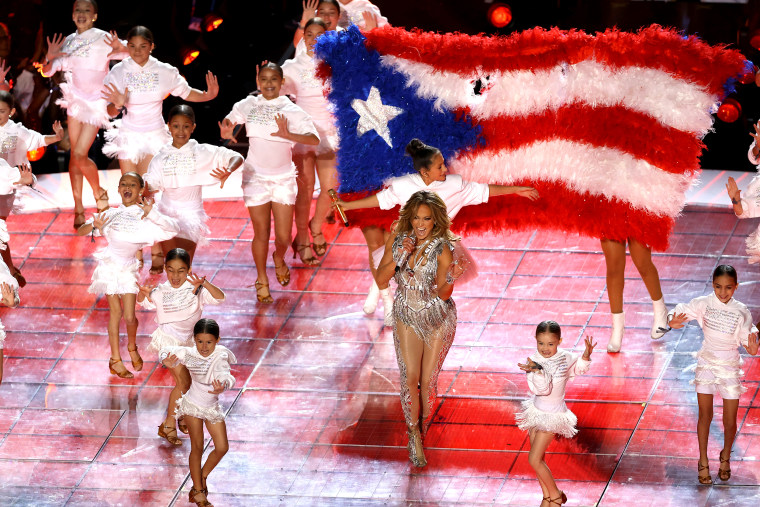What 102 million Americans saw at the Super Bowl halftime show Sunday night was not just a musical showcase by two Latina superstars; it was not even close to the allegedly morally indecent display decried by Franklin Graham and other pearl-clutchers offended by the athleticism and artistry on display by two women of color. What they witnessed was the real face, and growing power, of America in 2020: There are 60 million Latinos in the United States — and growing — a powerful voting block that could impact Trump’s re-election this year.
“I think it’s super important for two Latina women to be headlining the Super Bowl,” Lopez said recently in a Los Angeles Times interview. “Especially right now in Trump's America.”
Want more articles like this? Sign up for the THINK newsletter to get updates on the week's most important cultural analysis
“Let’s show the world what two little Latina girls can do,” the Bronx-born Lopez, 50, of Puerto Rican heritage, then wrote to Colombian singer Shakira, 43, on Instagram before both went on stage.
From Shakira’s shoutout of “Hola Miami,” to a city that is more than 72 percent Hispanic, her dominating strut on the stage singing “She Wolf” or “Hips Don’t Lie,” let alone playing a black sequined guitar, to Lopez’s spectacular entrance perched atop a pole that resembled the Empire State Building — like a Latina Queen Kong — that they surely did.
Representing a hugely diverse Latino population at a politically sensitive time, the show was also gloriously Hispanic, including two other Spanish-speaking artists of the moment, the millennial Puerto Rican rapper Bad Bunny (who performed with Shakira) and the Colombian reggaeton singer J Balvin (who performed with Lopez).
But it was truly Lopez’s show and she took the stage and dealt a masterful go-to-hell to President Donald Trump as only a Boricua diva can: Wrapped in a tulle-and-feather cape with the image of the Puerto Rican flag inside and the U.S. flag on the outside (custom designed by Versace, no less), at what will likely be the most-watched prime time broadcast program of the year in America.
For Puerto Ricans, that was the crowning moment of the halftime show, especially as it came as Lopez, together with her daughter Emme, 11, sang a mashup of the chorus of the 1984 Bruce Springsteen hit “Born in the USA” — a dark, working class lament often misunderstood and misused by politicians — and Lopez' first hit, the Gloria Estefan-penned inspirational anthem "Let's Get Loud." Emme, along with a chorus of other young singers, had just prior to that duet emerged from glowing cages on the field — which both Lopez and her choreographer referenced in an interview and an Instagram post as all but explicitly political — to sing the start of "Let's Get Loud."
For Lopez to at that moment come on stage and unfurl the coat, showcasing both the U.S. and the island’s flag, was both an explicit reference to Puerto Ricans' (and Latinos') Americanness and a not-so-subtle sequined middle finger at the neglect and contempt with which the Trump administration has treated Puerto Rico, a colony of the U.S. since 1898.
Puerto Rico has suffered from a 13-year recession brought on by a crushing $73 billion debt, a federal financial control board imposed by Washington, the terrible aftermath of Hurricane Maria that killed 3,000 people and recent earthquakes.
But while the iconography in Lopez's performance meant certain things to mainland Americans — who focused first and foremost on debating the appropriateness of the women's costumes and then on the children in cages — Puerto Ricans had their own debates with which to contend. Statehood supporters in Puerto Rico, who favor a permanent union with the U.S. (but whose party took a beating with the ouster of Gov. Ricardo Rosselló in the midst of a crisis-driven scandal last year), mistaking "Born in the USA" for a patriotic anthem, took Lopez’s performance to mean that she was on their side.To Puerto Ricans who favor independence, however, Lopez's flag coat represented the liberation of the island: From inside the American flag, out came the Puerto Rican flag, free and in all its glory.
Lopez, though, can’t be all things to all people, and her performance was her message, delivered her way. “Puerto Ricans belong in the United States" is a message one cannot fault her for — she was, after all, born on the mainland — it nonetheless often clashes with another very important message: “The United States does not belong in Puerto Rico.”
Yet, no matter where one sits on the issue of Puerto Rican independence, Lopez delivered a powerful message at a crucial time for the many Puerto Ricans who endured a U.S. president throwing both paper towel rolls and insults at us. When she unfurled her coat to display an immense (and clearly immensely expensive) Puerto Rican flag, it made us feel proud.
Related:


